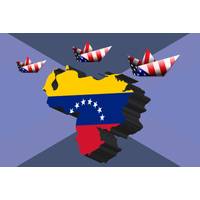Oil at Three-Month High on Iraq Anxiety
Oil prices surge as Iraq violence escalates; European shares stable as growth concerns cap gains.
Oil prices hit a three-month peak on Thursday on worries escalating violence in Iraq may disrupt supply while European shares stabilised near 6-1/2-year highs with gains capped by global growth concerns.
Investors have become increasingly anxious after militants from an al-Qaeda splinter group captured Mosul, the OPEC producer's second largest city, and appeared to be making rapid advances towards the Shi'ite-led government in Baghdad.
Brent futures - an international oil benchmark sensitive to geopolitical turmoil - jumped more than $2 to $112.29 a barrel, the highest since early March.
"I would entirely ascribe this move to the insurrection in the north of Iraq ... The fear is that it will cause a threat to Iraqi oil exports," Christopher Bellew, a trader at Jefferies Bache, said.
"If this conflict knocked out Iraq as an exporter, that would have significant impact on prices ... How high could they go? It depends on what happens."
Events in Iraq and renewed concerns about the pace of global growth made investors tread cautiously in riskier assets.
European, U.S. and Asian shares retreated from multi-year and record peaks reached this week after the World Bank cut its global growth forecast.
The FTSEurofirst 300 index of top European shares was slightly up on the day at 1,393.75 points, hovering just below the 1,398.65 peak hit earlier on Wednesday. U.S. stock index futures pointed to a steady to slightly higher open on Wall Street, as investors look for further impetus to keep buying.
"After such a good rally, it's not the time to buy right now, it's better just to sit on your gains. The market is quite vulnerable to negative news at the moment," said Philippe de Vandiere, analyst at Altedia Investment Consulting, in Paris.
"On the longer term however, earnings in Europe will start to recover in the next few months, which should lift stocks going forward."
RESURGENT KIWI
Among major currencies, the New Zealand dollar jumped 1.3 percent to a four-month high after the central bank raised interest rates and retained a hawkish bias, surprising some investors who had bet on a slower pace of rate hikes.
The kiwi surged more than one percent to $0.8676.
Other major currencies were little changed with the euro stuck near the four-month low hit after the European Central Bank cut its own rates last week.
The euro traded at $1.3523, compared with a low of $1.3503 hit on Thursday. The euro has fallen almost 1 percent this week as the effects of the ECB's easing policies spread through markets but the jury remains firmly out on whether the bank has managed to turn the tide.
A stronger dollar on the basis of improvement in the U.S. economy and a resulting rise in Treasury yields was many banks' base scenario for 2014 at the start of the year.
"It does feel like lower yields are starting to weigh on the euro," said Paul Robson, a currency strategist at RBS in London.
"I don't quite want to jump on the bandwagon yet - the reasons for the euro's strength this year have not quite gone away. Yes, it may go through $1.35, but I don't think it will go much beyond that."
In fixed income, peripheral euro zone bond yields pulled away from record lows as investors made way in their portfolios to take down bond sales from Italy and Spain.
Spanish 10-year bond yields were up 4 basis points at 2.67 percent as Madrid also took steps to ease its hefty upcoming debt repayments by switching expensive debt issued at the height of the sovereign debt crisis for a new 10-year bond.
Equivalent Italian yields were up 2 bps at 2.81 percent as the market digested an auction of 8.5 billion euros of three-, seven-, and 30-year bonds.
By Emelia Sithole-Matarise



